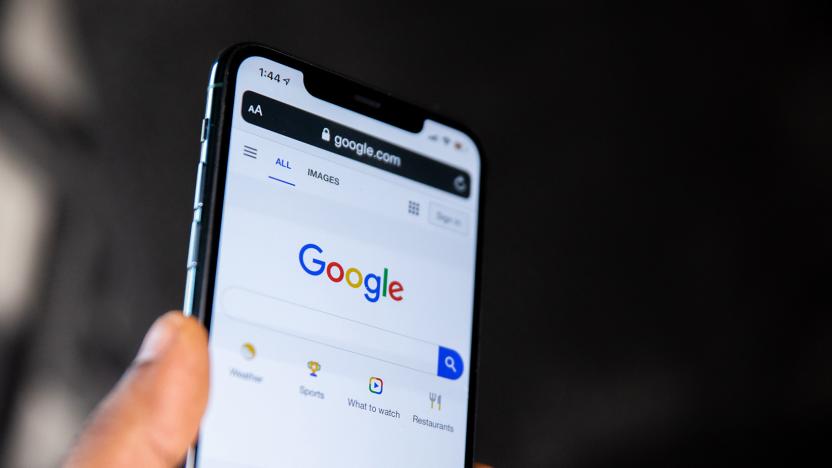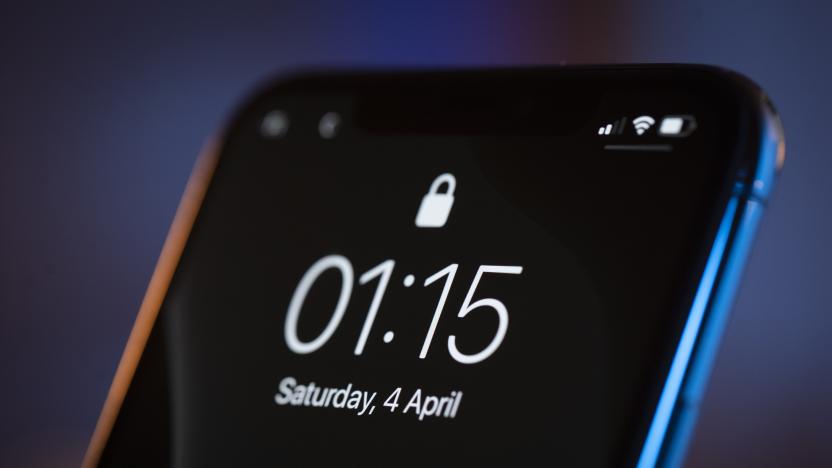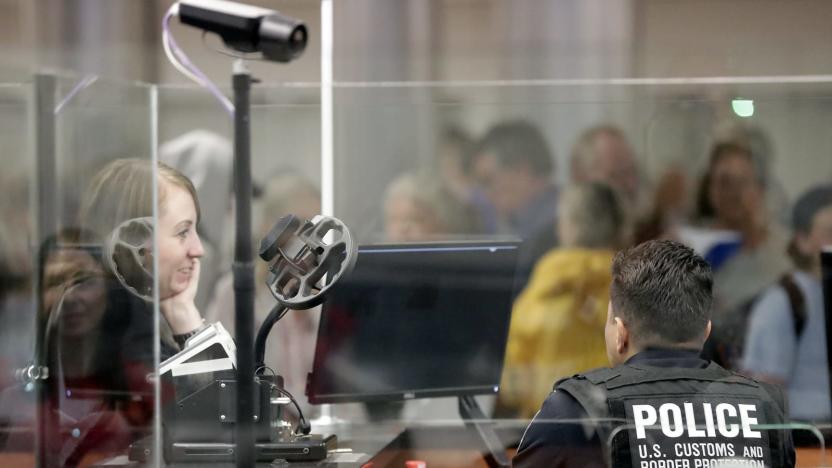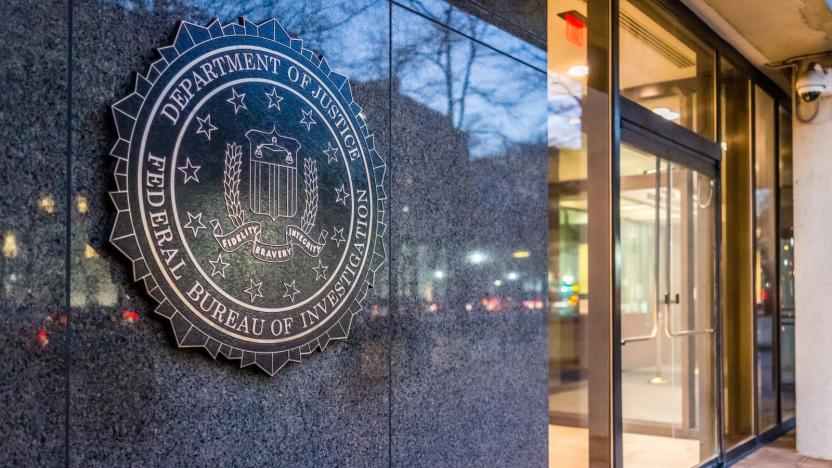fourth amendment
Latest

Records reveal the scale of Homeland Security's phone location data purchases
Records show Homeland Security bought massive amounts of phone location data — including a huge burst in 2018.

The Treasury Department is buying sensitive app data for investigations
The Treasury Department has bought sensitive app data for investigations, possibly bypassing due process.

Google is sharing user data tied to search keywords with law enforcement
Google is giving police IP addresses for users based on warrants tied to search keywords, raising questions about constitutional rights.

House amendment would require warrants for web history searches
Congresswoman Zoe Lofgren announced an amendment that would prohibit the collection of Americans’ internet search history and web browsing data without a warrant.

District judge rules FBI needs a warrant to access your lock screen
A Washington state judge ruled that the FBI needs a search warrant to look at a suspect's lock screen.

Court says data swept up by the NSA is protected by the Fourth Amendment
An appeals court may have just shaped how the US treats the NSA's bulk data collection. The Second Circuit Court of Appeals has ruled that American communications scooped up under the Foreign Intelligence Surveillance Act's Section 702 and PRISM is protected by Fourth Amendment rights baring unreasonable searches and seizures. Judges found that the "vast majority" of the evidence collected in a terrorism case against Agron Hasbajrami was permissible under the Fourth Amendment, but that the querying that data "could violate" the amendment -- and thus that it was fair to challenge the data use on constitutional grounds. It also believed that the accidental collection of Americans' data raised "novel constitutional questions" that could be answered later.

Federal judge rules suspicionless device searches at the border are illegal
Civil liberties advocates just scored an important victory in a bid to prevent arbitrary device searches at the US border. A federal court handling a 2017 lawsuit has ruled that US policies allowing device searches without valid suspicion or warrants violate Fourth Amendment protections against unreasonable searches and seizures. Judge Denise Casper noted that an exemption for searches at the border was "not limitless," and still needed to strike a balance between privacy and government interests. That usually means focusing on contraband, she said.

FISA court: FBI use of NSA's electronic surveillance data was illegal
A US court ruled that some of the FBI's electronic surveillance activities violated the constitutional privacy rights of Americans. The Foreign Intelligence Surveillance Court (FISC) deemed that FBI officials improperly searched a National Security Agency (NSA) intelligence database for info on Americans. The ruling was made last year but just revealed by the intelligence community today.

ACLU: Police must get warrants to obtain personal data from cars
You might not think of your car as a treasure trove of personal data, but it frequently is -- performance data, phone contacts and location info may be sitting under the hood. And the American Civil Liberties Union wants to be sure police can't just take it. The organization is appearing as a friend of the court in Georgia's Supreme Court on June 19th to argue that personal data on cars is protected by the US Constitution's Fourth Amendment and thus requires a warrant. The appearance is tied to a case, Mobley vs. State, where police used a car's "black box" to level more serious charges.

Judge rules Facebook users can share friends' profiles with the feds
It's not the backdoor access that the FBI has been pushing for, but US District Judge William Pauley III has now ruled that it and other law enforcement agencies are entitled to view your Facebook profile if one of your "friends" gives them permission to do so. As GigaOm reports, that ruling comes as part of a New York City racketeering trial, in which one of the accused, Melvin Colon, had tried to suppress evidence turned up on Facebook that led to his indictment. That information was obtained through an informant who gave investigators access to the profile, something that Colon had argued violated his rights against unreasonable searches and seizures under the Fourth Amendment. In the ruling, Judge Pauley dismissed that claim, likening the Facebook access instead to a phone wiretap in which one person on the call allows the government to monitor it -- a practice that has been ruled constitutional. GigaOm also has the ruling in its entirety at the source link below for those interested.

Sixth Circuit rules that law enforcement doesn't need a warrant to track your phone
If you go through tin foil like there's no tomorrow (or because you think there's no tomorrow), you might want to head down the store. A recent 2 - 1 ruling by the Sixth Circuit Court of Appeals has determined that law enforcement agencies can obtain cellphone location data, without the need for a warrant. The decision comes after a defendant in a drug-related case claimed protection from his phone's GPS location data being used under the Fourth Amendment. Judge John Rogers stated that the defendant didn't have a reasonable expectation of privacy for data given off by a voluntarily purchased phone, going on to state that if tools used in such crimes give off a trackable signal, police should be allowed to use it. Rogers likened it to the use of dogs tracking a scent, and criminals complaining they didn't know they were giving one off, or that the dog had picked it up. The use of technology in crime prevention, be it police tools, or that belonging to the greater population, has long been a source of complex discussion, and this latest development is unlikely to be the end of it. But for now, at least one guy is rueing his decision to get a better phone. Hit the source for the full case history.

FBI deactivates about 3,000 GPS tracking devices, loses sight of your car
Following a January ruling by the US Supreme Court, the FBI has deactivated some 3,000 GPS units that were potentially infringing on the Fourth Amendment. The decision seems to be making waves in the U.S. Justice Department. Andrew Weissmann, FBI General Counsel, says some of the devices have been difficult to retrieve, as the vehicles they were once tracking now move undetected. The FBI has sought temporary permission to reactivate some of the devices to locate and retrieve the hardware. Weissmann says the FBI is also developing new guidelines regarding the legality of its agent's actions -- from the application and use of tracking devices, to the extent a suspect's garbage can be searched before the agent is committing trespass. In short, the FBI is working really hard not to violate your legal right to privacy. If you happen to find something weird under you car, give 'em a call. They'd probably like it back.

Hawaii's proposed online tracking law comes under fire from ISPs, civil libertarians
There may be some trouble brewing in paradise, thanks to a seemingly draconian law currently under consideration in Hawaii's state legislature. If passed, H.B. 2288 would require all ISPs within the state to track and store information on their customers, including details on every website they visit, as well as their own names and addresses. The measure, introduced on Friday, also calls for this information to be recorded on each customer's digital file and stored for a full two years. Perhaps most troubling is the fact that the bill includes virtually no restrictions on how ISPs can use (read: "sell") this information, nor does it specify whether law enforcement authorities would need a court order to obtain a user's dossier from an ISP. And, because it applies to any firm that "provides access to the Internet," the law could conceivably be expanded to include not just service providers, but internet cafes, hotels or other businesses. Democratic Representative John Mizuno is the lead sponsor of the bill, though his support already seems to be waning. Not long after H.B. 2288 was introduced, Republican Representative Kymberly Pine told CNET that she would be withdrawing her support for it, adding that her intent was not to track Hawaiian web surfing, but to simply protect "victims of crime." "We do not want to know where everyone goes on the Internet," Pine explained. "That's not our interest. We just want the ability for law enforcement to be able to capture the activities of crime." Pine went on to acknowledge that the proposal has come under fire from many civil libertarians and internet companies within the state, and that the measure will likely be revised. In retrospect, she said, the concept of storing personal information "was a little broad," and Hawaii's lawmakers "deserved" the criticism they received during today's hearing.

Supreme Court says police must get search warrant to use GPS tracking devices
The US Supreme Court ruled today that police must first obtain a search warrant before using GPS devices to track a suspect's vehicle, agreeing with an earlier appeals court ruling but rejecting the Obama administration's position on the case. In delivering the decision, Justice Antonin Scalia wrote that the court holds "that the government's installation of a GPS device on a target's vehicle, and its use of that device to monitor the vehicle's movements, constitutes a 'search,'" and therefore violated the individual's Fourth Amendment rights. The case itself concerned a Washington DC nightclub owner and suspected drug dealer, Antoine Jones, who had his car's movements monitored for a month and was eventually sentenced to life in prison, only to see that conviction overturned by the aforementioned appeals court on the grounds that the police did not have a search warrant when they placed the GPS tracking device on his vehicle.[Image courtesy Wired]

Texas judge says warrantless cellphone tracking violates Fourth Amendment, saga continues
Rev up the bureaucratic turbines, because a judge in Texas has determined that warrantless cellphone tracking is indeed unconstitutional. In a brief decision issued earlier this month, US District Judge Lynn N. Hughes of the Southern District of Texas argued that seizing cellphone records without a search warrant constitutes a violation of the Fourth Amendment. "The records would show the date, time, called number, and location of the telephone when the call was made," Judge Hughes wrote in the ruling, linked below. "These data are constitutionally protected from this intrusion." The decision comes in response to an earlier ruling issued last year by Magistrate Judge Stephen Smith, also of the Southern District of Texas. In that case, Judge Smith argued against unwarranted wiretapping on similarly constitutional grounds, pointing out that with today's tracking technology, every aspect of a suspect's life could be "imperceptibly captured, compiled, and retrieved from a digital dossier somewhere in a computer cloud." The federal government appealed Judge Smith's ruling on the grounds that the Fourth Amendment would not apply to cellphone tracking, because "a customer has no privacy interest in business records held by a cell phone provider, as they are not the customer's private papers." Judge Hughes' decision, however, effectively overrules this appeal. "When the government requests records from cellular services, data disclosing the location of the telephone at the time of particular calls may be acquired only by a warrant issued on probable cause," Judge Hughes wrote. "The standard under [today's law] is below that required by the Constitution." The law in question, of course, is the Stored Communications Act -- a law bundled under the Electronic Communications Privacy Act of 1986, which allows investigators to obtain electronic records without a warrant. This month's decision implicitly calls for this law to be reconsidered or revised, though it's certainly not the only ruling to challenge it, and it likely won't be the last, either.

DoJ: Stingray cellphone tracking device falls under Fourth Amendment, but don't ask about it
In 2008, federal authorities arrested David Daniel Rigmaiden on charges of spearheading a massive identity theft ring in Arizona. Rigmaiden allegedly led this operation from January 2005 to April 2008, harvesting some $4 million off of more than 1,900 fraudulent tax returns. He was ultimately nabbed, however, thanks in part to controversial, and somewhat mysterious tool known as a "stingray" -- a device that effectively acts as a fake cell tower, allowing authorities to locate and track a cellphone even when it's not being used to place a call. Since his arrest, the 30-year-old Rigmaiden has been battling the feds in the U.S. District Court of Arizona, on allegations that their tracking tactics constituted an unlawful search and seizure, thereby violating his Fourth Amendment rights. For more than a year, the Department of Justice has maintained that the use of stingrays does not violate the Fourth Amendment. When it comes to sending data from a mobile device, the DoJ has argued, users should not have a "reasonable expectation" of privacy. Recently, though, the judge overseeing the case has indicated that he will press the feds for more information on how stingrays actually work -- something the government clearly has no desire to disclose. Prosecutors are so reluctant, in fact, that they may be willing to sacrifice their case against Rigmaiden in order to safeguard the stingray's secrecy. Read more about the latest developments, after the break.

New York judge denies government warrant for Verizon location data
Beating the man at his own game on Monday, a federal judge from the Eastern District of New York denied the US government's application asking Verizon Wireless to hand over 113 days of customer location data. Washington has long debated whether or not the Constitution protects modern day communications that include a third party (like cell phone conversations supported by a carrier company), and non-conversational meta data (like cellular GPS location data). Some say that buying a cell phone and using a carrier's services waives one's privacy rights in that data, while others claim we have a reasonable expectation of privacy in such info under the Fourth Amendment. In making his decision, Judge Nicholas Garaufis held that "the fiction that the vast majority of the American population consents to warrantless government access to the records of a significant share of their movements by 'choosing' to carry a cell phone must be rejected." As communications tech continues to change, these questions will likely be revisited. That's why Judge Garaufis went on to say that "in light of drastic developments in technology, the Fourth Amendment doctrine must evolve to preserve cell-phone user's reasonable expectation of privacy in cumulative cell-site-location records." Get the full opinion by clicking the source below.

Sixth Circuit rules that the government needs a warrant to search your email
Score another baby step for digital democracy: the Sixth Circuit Court of Appeals ruled today that the government must have a search warrant before it can obtain email from your provider. Specifically, the court held in U.S. v Warshak that "it would defy common sense to afford emails lesser Fourth Amendment protection" than traditional communications like phone calls and postal mail. Yes, you'd think that would be obvious, but the specific question had never actually been raised at the appellate level before, so the decision is critically important -- it's likely that other courts will take their cue from the Sixth Circuit when faced with similar issues. As the EFF points out, however, there are several legal exceptions to the warrant requirement in the Stored Communication Act that the organization is still fighting to have amended, but hey -- we'll take every little bit of progress we can.

Court reaffirms: fourth amendment rights not violated if the police install a GPS device on your car when it's not in your garage
Back in January, a court in Portland, Oregon ruled that the Fourth Amendment rights of one Juan Pineda-Moreno had not been violated by the police when they tracked him using various GPS devices they installed on the underside of his Jeep with magnets. You see, the police suspected that Pineda-Moreno was growing Marijuana somewhere, and they really didn't like that. Eventually, Pineda-Moreno was arrested and convicted of crimes involving the growth of said Marijuana -- but he appealed the decision because he thought that his Fourth Amendment rights (the one which guards against unreasonable search and seizure) had been violated. The appeals court has recently upheld the original decision, but there were five dissenting votes, meaning that the case is anything but cut and dried. Now, what's obvious is that the police didn't have to traverse into "private" space to attach the tracking device to the suspect's car, but clearly it's debatable -- even as far as the judges are concerned -- what constitutes private and public space. The case is surely not going to end here, so we'll keep you updated. In the meantime, watch your back.







